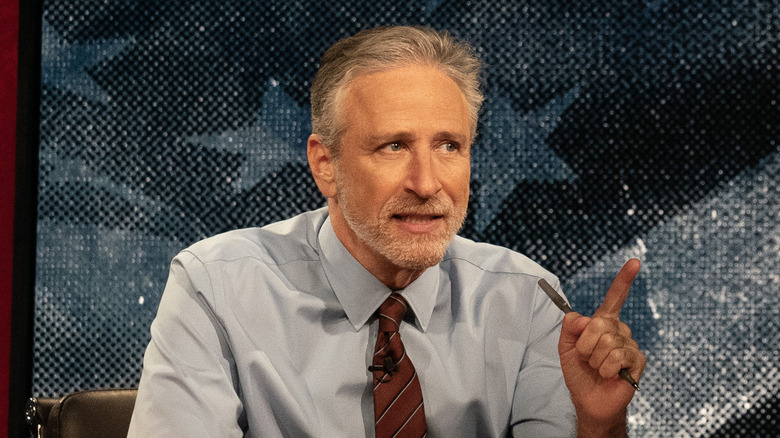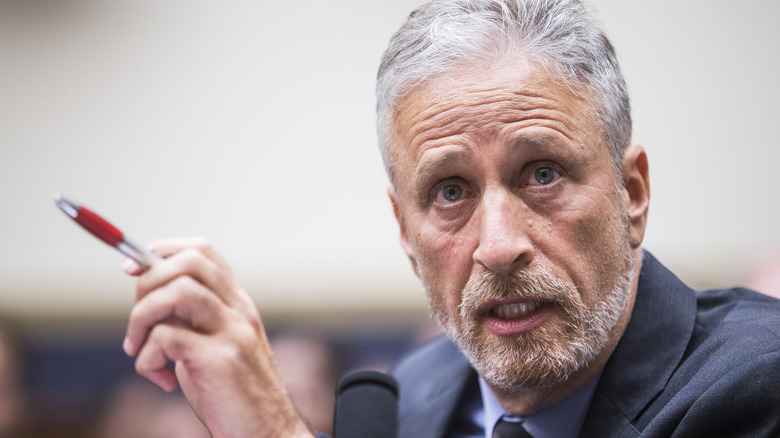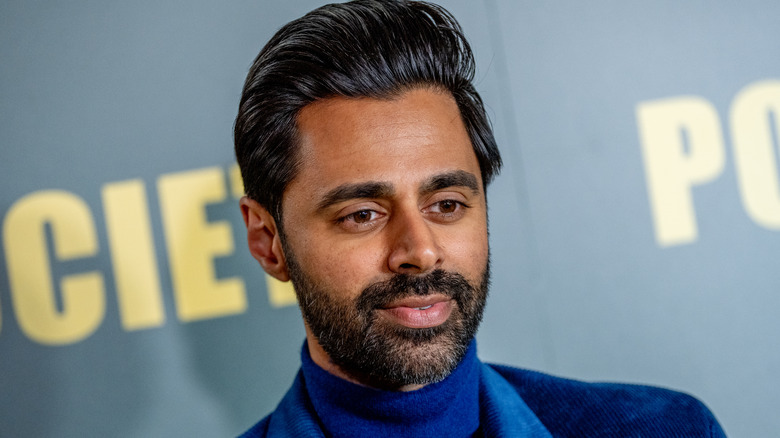The Problem With Jon Stewart's Cancellation Is More Complicated Than You Think
"The Problem with Jon Stewart" has been abruptly canceled at Apple TV+ just weeks before taping for Season 3 was scheduled to begin. The political talk show, which embraced the same general format and irreverent humor that its host made popular on "The Daily Show," marked Stewart's return to the medium after a six-year hiatus. The reason for the show's cancellation, however, isn't as simple as just low viewership or dwindling interest.
Stewart has never shied away from making enemies. His work on "The Daily Show" spearheaded a whole movement of comedically-tinged, left-leaning political talk shows that includes John Oliver's critically acclaimed "Last Week Tonight" and other now-defunct series like Hasan Minhaj's "Patriot Act" and "Full Frontal with Samantha Bee." Throughout his career, Stewart has used his platform to comment on everything from American warmongering and domestic gun laws to racial justice and veterans' healthcare. His style has always been bold, and he's often lambasted right-wing politics and corporate America in particular.
Now it seems that those strong views may have led to the cancellation of "The Problem." A report from The New York Times cites several sources close to the show who have claimed that Apple and Stewart parted ways over "creative differences." However, the report suggests that Apple's real motivation is far more political than artistic.
Apple reportedly cancelled The Problem due to controversial Season 3 topics
According to The New York Times, "The Problem with Jon Stewart" was canceled in part because of several topics intended for Season 3 — specifically, episodes focused on China and artificial intelligence. These are both areas where Apple has major vested interests, so it seems plausible that executives outside the company's entertainment division might blanch at the prospect of funding and hosting high-budget critiques.
It's impossible to say for certain, of course, as Season 3 has now been canceled, but it's hard to imagine a commentator like Stewart coming out in support of widespread AI development. The technology has become incredibly polarizing over the past year, in large part due to legal questions over the right of generative AI to use uncredited work as inspiration. Apple has already picked a clear side in that debate, with the company planning to spend close to $1 billion annually going forward in efforts to catch up to competitors in the AI space.
The Times report doesn't clarify exactly what Season 3 of "The Problem" was going to cover regarding China, but Apple has an obvious desire to maintain strong relationships there as well. More than 95% of Apple's phones, computers, tablets, and other devices are made in China — a staggering figure made even more striking by the allegations that Apple has faced of unethical working conditions in its Chinese factories.
The Problem is just the latest streaming talk show to get canned
Based on the New York Times report, it seems clear how a commentator like Jon Stewart might cause friction in a tech megacorporation like Apple. In some ways, it's surprising that his series lasted this long. The first two seasons already tackled issues like gender-affirming care for transgender minors and the United States' rampant gun violence epidemic. Sources told the Times that with the 2024 presidential election coming up, Apple likely feared being caught in the political crosshairs of boycotts and controversy.
Unfortunately, this isn't the first instance of a streaming giant giving up on this kind of programming. Netflix canceled "Patriot Act" after two years and six seasons. In the years prior, the streamer gave up on other short-lived talk shows like Chelsea Handler's "Chelsea" and "The Joel McHale Show." John Oliver — an alumnus of Stewart's "Daily Show" — has had the most success in recent years with "Last Week Tonight," which has earned dozens of Emmy wins over the course of a run that's approaching 10 years. But of course, HBO is quite different from more modern platforms like Netflix and Apple TV+.
Some of these cancellations are surely the result of programming mismatches. After all, talk shows are a classic TV formula, and they've certainly struggled to find an audience on streaming. But in the case of "The Problem," it's hard not to see Apple's rug-pull as media censorship. The more that companies like it and Amazon expand their streaming empires, the more people like Stewart will likely run afoul of corporate interests.


